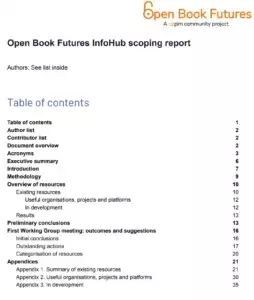



Unlocking the Future of Open Access Book Publishing: A Comprehensive Roadmap
The Open Book Futures (OBF) project, led by the Community-led Open Publication Infrastructures for Monographs (Copim), has released a comprehensive scoping report that aims to establish a robust knowledge base for alternative funding models, publishing modes, and best practices in open access book acquisition and archiving. This report serves as a crucial first step in a broader initiative to accelerate the adoption of open access publishing and related initiatives among libraries, publishers, academics, and the general public.Empowering the Open Access Book Revolution
Consolidating Existing Resources and Identifying Gaps
The OBF project has undertaken a thorough review of the existing resources and guidance available for open access book publishing. This scoping report presents an overview of these assets, highlighting the diverse range of information and tools already available to stakeholders. However, the report also identifies key gaps in the current landscape, providing a roadmap for the OBF working group to address these shortcomings and develop a comprehensive knowledge base.One of the primary objectives of the OBF project is to consolidate and curate the wealth of resources scattered across various sources. By bringing together this information in a centralized and accessible platform, the project aims to streamline the discovery and utilization of best practices, funding models, and innovative publishing approaches. This consolidation will not only benefit individual stakeholders but also foster greater collaboration and knowledge-sharing within the open access book ecosystem.
The gap analysis conducted in the scoping report reveals areas where additional resources and guidance are needed. This includes, but is not limited to, the need for more comprehensive information on alternative funding models, experimental publishing techniques, and cutting-edge archiving and preservation strategies. By addressing these gaps, the OBF project can empower stakeholders with the tools and knowledge necessary to navigate the evolving landscape of open access book publishing.
Advocating for Open Access and Driving Adoption
The OBF project recognizes the importance of actively promoting and advocating for open access book publishing. The scoping report outlines the project's commitment to engaging with a diverse range of stakeholders, including libraries, publishers, academics, and the general public, to raise awareness and encourage the adoption of open access initiatives.By providing a comprehensive suite of resources and guidance, the OBF project aims to equip these stakeholders with the knowledge and confidence to embrace open access publishing. This includes showcasing successful case studies, highlighting the benefits of open access, and offering practical advice on implementing open access models within their respective organizations.
The project's outreach efforts will also focus on fostering collaboration and knowledge-sharing among the various players in the open access book ecosystem. By facilitating these connections and dialogues, the OBF project can help break down silos, promote cross-pollination of ideas, and accelerate the widespread adoption of open access publishing.
Shaping the Future of Open Access Book Publishing
The Open Book Futures project is poised to play a pivotal role in shaping the future of open access book publishing. Through its comprehensive scoping report and the subsequent development of a robust knowledge base, the project is laying the groundwork for a more equitable, sustainable, and innovative publishing landscape.By addressing the gaps in existing resources, the OBF project will empower stakeholders with the tools and knowledge necessary to navigate the complexities of open access book publishing. This includes exploring alternative funding models, experimenting with new publishing approaches, and implementing best practices in archiving and preservation.
Moreover, the project's commitment to advocacy and outreach will help drive the adoption of open access initiatives, fostering a cultural shift within the publishing industry and academia. As more libraries, publishers, and researchers embrace open access, the OBF project can catalyze a transformative change in the way scholarly knowledge is disseminated and accessed.
Ultimately, the Open Book Futures project represents a significant step forward in the ongoing quest to make open access book publishing a mainstream and sustainable reality. By providing a comprehensive roadmap and empowering stakeholders, the project is poised to unlock the full potential of open access, revolutionizing the way we create, share, and preserve scholarly knowledge for generations to come.
